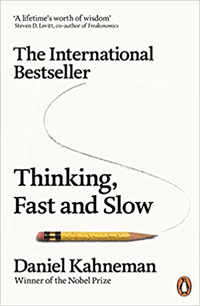 Daniel Kahneman, Thinking, Fast and Slow (New York: Farrar, Strauss and Giroux, 2011), 499pp.
Daniel Kahneman, Thinking, Fast and Slow (New York: Farrar, Strauss and Giroux, 2011), 499pp.
A review by physicist Brad Keister.
In this book, Daniel Kahneman, now an emeritus professor of psychology at Princeton, provides an overview of his life’s work on how our mind works in judgment and decision making. An important segment of Kahneman’s research was done in collaboration with Amos Tversky over many years. Tversky died in 1996, and would likely have shared the 2002 Nobel Prize in Economics with Kahneman had he lived.
Kahneman distills our thinking processes into two ‘systems’: System 1 (fast, intuitive, emotional), and System 2 (slower, deliberate, logical). System 1 is a critical asset: it allows us to make quick decisions when needed, and it often pulls together a long history of information and experience so that we don’t have to plod through it all. We rely on System 2 for making decisions when time permits the slower process.
But System 1 has its limits: it also contains emotional history that is not always based upon fact, and it can lead us to conclusions that are at odds with a careful System 2 analysis. Worse, we may be confident that we’ve done a System 2 analysis when in fact we haven’t. The book provides many examples ranging from our personal and family choices to corporate strategies.
Kahneman also provides a summary of prospect theory, which he developed with Tversky, which theory describes how the notion that we make rational choices (which underlies much of economics) is incomplete. When assessing risk, our view of potential loss carries more weight than an equivalent sense of gain. For example, we may take a more negative view of the statement, “This surgical procedure carries a 1% mortality rate,” than the equivalent, “This surgical procedure has a 99% survival rate.”
We are now living in a time when we are bombarded with emotionally charged information, much of which claims to be rationally based. Kahneman’s book can be considered a challenge to slow down and take a second — or third — look at the issues of our day. Numerous media listed Thinking, Fast and Slow as one of the best books of 2011 (The Economist and the New York Times), and the National Academy of Sciences awarded it their Best Book Prize in 2012.


